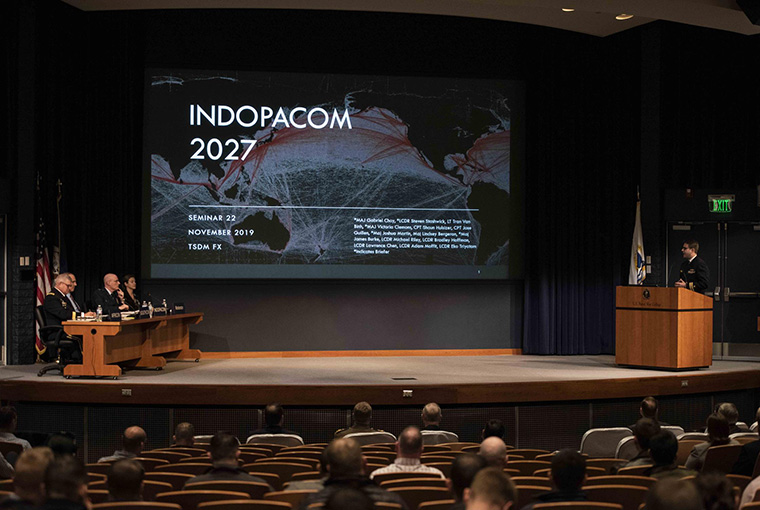U.S. Naval War College Students Compete in Theater Strategic Planning Exercise

U.S. Naval War College students squared off this week in a competition meant to hone their analytical skills regarding decision-making in the world’s major security theaters.
The annual exercise is part of the college’s theater security decision-making coursework in the National Security Affairs Department. The winning group received the James G. Stavridis Award for Excellence in Theater Strategic Planning.
The students, organized in 23 seminar groups of 13 to 15 people, made competing presentations that outlined future issues and strategies for five of the United States’ combatant command areas -- Africa, the Indo-Pacific, Latin America/Caribbean, Europe and the Middle East.
The exercise was intended to mirror the real-life requirements of high-level strategic planning work, said Derek Reveron, chair of the National Security Affairs Department
“We started the term in early August with the simple goal of making you more effective in a command and staff environment,” Reveron told the teams on Wednesday, Nov. 6.
“We spent about 10 weeks studying international security and U.S. foreign policy analysis. The last two weeks, you were able to function in an operational planning team, where you gained experience working with your peers to develop a strategy to advance and defend U.S. interests in a region,” he said.
The winning seminars for each region went on to a final five-way competition on overall excellence in ideas and presentation.
“The purpose of the exercise is after weeks and weeks of reading and discussing, this gives the students an opportunity to practice all of it,” said associate professor Lindsay Cohn, who teaches in the National Security Affairs Department and served as moderator of the exercise.
“This is an opportunity to practice the skills that they have learned, to see what goes into the policies they usually have to execute,” she said.
Cohn said that part of the exercise’s challenge for students is that there are no obvious right answers.
“We try to make them more comfortable with ambiguity, with uncertainty, with complexity,” she said.
“We are giving them a huge task in a fairly short amount of time, and they have to live with the fact that they are not analyzing something’s that already happened. They are trying to predict the future and how they would deal with it.”
The judges were real-world leaders and decision-makers. This year’s panel was made up of retired Adm. Lars Saunes, former chief of the Royal Norwegian Navy; Maj. Gen. Kenneth Moore, special assistant to the commander of U.S. Africa Command; Steven Wetzel, deputy director for strategy, policy and plans at U.S. Southern Command; Australian Brig. Michael Prictor, director of the U.S. Central Command combined planning group; and Col. Scott Burnside; chief of the Southeast Asia policy division at U.S. Indo-Pacific Command.
Wetzel told students that he will carry some of their thoughts back to Southern Command.
“If you think this is an academic exercise, think again. It’s not. This is what you are going to do,” said Wetzel, in a nod to the likelihood that many Naval War College students will go on to positions on the staffs of major U.S. commands and agencies.
“If you think it was painful trying to reach a consensus to push forward a campaign plan – it is. It is painful, it is invigorating, and it is very, very rewarding when you publish a product and you can see yourself in that product, and you know you are going to make a difference when that campaign is executed.”
Burnside told students that he’s glad to see them spending time studying a problem before forming a response plan.
“It’s really key, first and foremost, to understand your area of responsibility, the issues that you are trying to resolve and their underlying cause,” said Burnside, who serves at the U.S. combatant command with the largest geographical reach.
“I see way too frequently where we do the inverse,” he said, adding that it’s vital to listen to all players.
“When we are talking about foreign countries with cultures very different from our own, we have a tendency to use our own experiences and paradigms and try to apply them to our area of responsibility,” he said.
“Listen more than you talk. It’s important to listen to our partners, if we truly want them to be partners.”
The winning team, announced at the end of competition on Nov. 7, was the finalist seminar that presented a strategy for U.S. Africa Command.
“What we tried to do was leverage nonconventional, non-DOD thought processes to arrive at a strategy that would work for Africom. What Africa needs right now is not necessarily what the DOD inherently possesses,” said team leader Marine Maj. Dana Howe.
“So out-of-the-box thinking, alignment and refinement of exercises and things that the DOD does have, to try to leverage what we can control – and that’s our partnerships and people.”
Howe said the team included five international officers from African nations, which made for a winning combination with the U.S. students.
“They provided insight into something we don’t know. I think only one of the American officers had ever been to Africa,” Howe said. “So it was leveraging their experiences, their thoughts and getting their buy-in that really combined for an effective strategy.”
